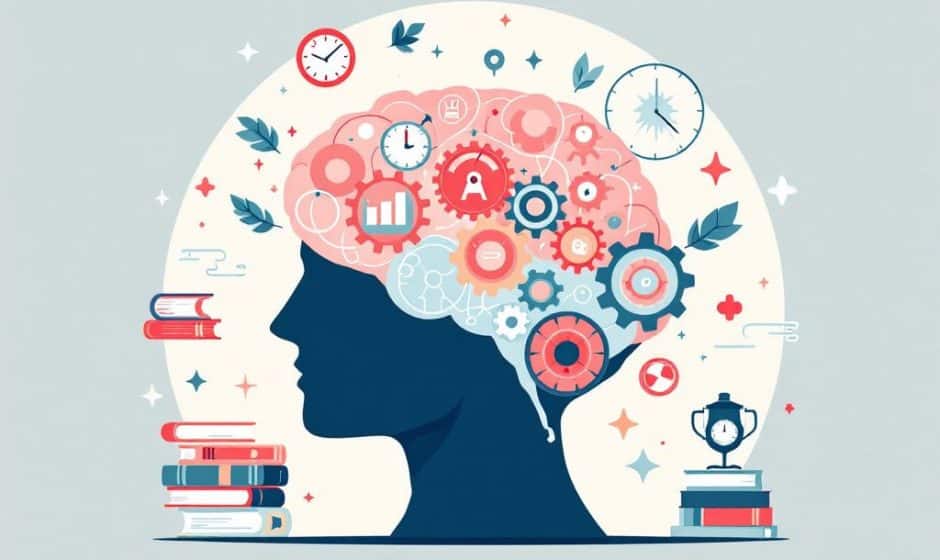Hey there, fellow students (and parents who are supporting those students)! 👋 As another school year swings into full gear, many of us find ourselves grappling with the not-so-simple task of balancing study life, social activities, and everything else in between. It can feel like spinning plates—a little too much wobble, and everything comes crashing down. So, how do you carve out time for studying while keeping your head above water? It’s all about the balance—specifically, how hormone regulation plays into keeping that balance and maintaining optimal student health throughout the year.
Find Your Focus
Staying focused as the workload ramps up is bigger than just “trying harder.” Here’s a scenario: you’re settled, books open, pen poised, ready to attack that mountain of work. And yet, your mind wanders. This isn’t laziness. Often, it involves those elusive little biochemical messengers—hormones. Hormone regulation might sound like something out of a science textbook, but trust me, it’s more practical than you think when it comes to staying on your academic A-game.
Understanding Hormone Regulation
Let’s dive in for a second here. Hormones like cortisol and adrenaline are your body’s secret sauce for juggling stress and workload. Picture them as the tiny supervisors in your brain, making sure everything’s operating smoothly during kickoff season. When you’re overwhelmed, cortisol kicks up, potentially interfering with your study efforts. But, get this—strategies that involve hormone regulation can get everything flowing just right again.
The Impact on Student Health
While we’re on this, it’s also about maintaining your overall student health. Glucose levels, sleep cycles, and stress responses interconnect magnificently with hormone regulation. A stable mood and energy throughout the day help ensure focus during class and keep evening study hours effective.
Need to Power Through? Start with Organization
Before diving head-first into stress-busting hormone tactics, look at your course load from above. Yeah, I’m talking macro-level thinking. Chart out major assignments, exams, and chunk them down into weekly obligations.
Break It Down

Consider making a study table (not the wood kind). Keep it old-school or go digital with an app, whichever you prefer. Here’s what you might do:
| Week | Main Tasks | Hormone Regulation Tip |
|---|---|---|
| 1-2 | Read and Note-Taking Basics | Sleep early, rise early to regulate melatonin, easing into a study groove. |
| 3-4 | First Drafts and Revisions | Reduce refined sugar to avoid cortisol spikes—it helps even out energy dips. |
| 5-8 | Exam Prep Begins | Incorporate adaptogens like Ashwagandha for stress up-regulation. |
Was that too much all at once? No worries, let’s pick it apart piece by piece. 🧩
Sleep: Your New Best Friend
First up is sleep. Missing those good seven to eight hours can hack away at your serotonin, the “feel-good” hormone, which we don’t want. Plus, melatonin goes out of whack. Result? Cranky mornings and pretty subpar performance.
Keeping Sleep Hygiene in Check
Fancy words for simple practices. Step away from your devices an hour before sleep—those screens meddle with hormone regulation like you wouldn’t believe. Trust me on this. Toss in a pre-bed relaxation routine, and you’ll be tuning into the dream network in no time.
Building Gentle Bedtime Rituals
Try winding down with a short meditation or a quick yoga stretch. Nothing major—maybe just making a ritual of flossing could signal to your brain it’s shut-eye time.
Nutrition Meets Hormones
Balancing hormones isn’t exclusive to sleep. Nutrition plays its star role too. We mentioned glucose control earlier. When you’re reaching repeatedly for energy drinks and candy bars—guilty as charged?—hello, sugar rushes, and good-bye focus.
Foods that Nourish Hormone Balance
Instead, opt for foods that stabilize blood sugar levels—a slow burn that keeps you going:

- Complex Carbs: Whole grains, beans, sweet potatoes. They provide energy without the spikes.
- Healthy Fats: Think olive oil, nuts, and avocados. Helpful for hormone building blocks.
- Fiber-Rich Fruits: Apples, pears—part of your study snacks. Keeps you full and focused.
Exercise: More Than Just PE
Exercise! Oblige me to spare a brief rant here. Little movements throughout the day can release endorphins, straightening out mood fluctuations. They’re the natural cushions for those stress impacts, assisting in both classroom performance and hormonal equilibrium.
Mini Workouts: Yes, Even A Quick Pace Matters
Aerobic exercises like walking or a small dance-off in your room can enrich student health phenomenally. Those moments break up study blocks and gently sway your physical rhythm back into order.
Stress Management Through Mindful Actions
You busy? Aren’t we all? Multitasking may seem like the way to tackle our bustling weeks, but concentrating deeply on one task at a time hones hormone regulation much more effectively.
Practicing Mindfulness
Ever heard of mindfulness? This ancient practice allows for present thinking, helping wrangle runaway thoughts. Try this: pick a simple task—could be washing dishes or organizing your desk—and do it with full attention. Notice the sensations, your reactions. Time operates differently at peak concentration—seemingly standing still at moments, offering precious micro-gains of intellectual clarity.
Implementing and Adjusting Your Routine
The real heat happens not just in making a plan but also tweaking it on the spot. Let’s revisit your weekly table:
Compare and Adjust

How are you doing, really? At the end of each week, ask yourself a simple series of questions:
- What felt off balance?
- Did I maintain my sleep routine effectively?
- Were there any particular stress spikes? What triggered them?
Depend on adaptability. Readjust shower times, maybe, if evening exams made sleep hard to recover. Dial down caffeine gradually to sustain morning alertness in harmony with your natural cycle.
Common Mistakes to Avoid
Here are common pitfalls, observed recurrently in this hectic juggling act:
- Overscheduled days without breaks ➜ Consider adding default “rest buffers.”
- Staring at screens endlessly ➜ Shift your study spots, giving your bloodstreams room to move.
Let’s Recap These Nuggets
Alright—intellectual companions—here’s the gist while savers that pre-exam breakdown:
- Sleep Structure: Prioritize it over late-night scrolling reliance.
- Eating Simplified: Mind hormonal impact through whole combinations.
- Strategic Movement: Work those battered stress releasing nodes.
- Attention Oasis: Aim for fully engaged intervals amidst hefty schedules.
Final Thought: Practice Time Blanket-ism
Back to school may bring challenge zones, but creating not just work-study times but these time blankets, lets tasks etch narratives conducive to success. Just… stay tuned-in to the rhythm you lay, whisper those quiet resolutions towards gently guided reflexes span of semesters—above all, evolve amidst expectation shifts, organic re-woven dreams, keeping the golden flame alight through thriving seasons.
Now get to it—keeper of future stories waiting to unfold. Keep harmonizing brains natural middle-oscillation pulsations so spotlight brilliance brightens chances’ handles! Saint Alright, corridor striders—Ace. This. Thing.
That’s it. Let me know all those mysterious milestone achievements! 🌟
Frequently Asked Questions
What is hormone regulation, and how does it affect the body?
Hormone regulation involves the balance and control of hormones, which are chemical messengers produced by glands in the endocrine system. These hormones influence various bodily functions, including metabolism, growth, and reproductive processes. An imbalance in hormone levels can lead to a range of symptoms and health issues, such as mood swings, fatigue, and changes in skin and bone health[3][5].
What causes hormonal imbalances, particularly during menopause and perimenopause?
Hormonal imbalances during menopause and perimenopause are primarily caused by the natural decline in hormone levels. During perimenopause, levels of oestradiol and progesterone fluctuate significantly, and during menopause, these hormone levels, along with testosterone, decrease and remain low. This decline can lead to symptoms such as hot flashes, mood changes, and vaginal dryness[1][3].
How does hormone replacement therapy (HRT) help in regulating hormones?
Hormone replacement therapy (HRT) works by topping up or replacing the missing hormones in the body. HRT typically includes oestradiol, progesterone, and sometimes testosterone, which are prescribed in various forms such as patches, gels, or pills. This therapy helps alleviate symptoms of menopause and perimenopause, improves sleep and energy levels, and protects against conditions like osteoporosis and heart disease[1][3].
What are the common side effects of hormone replacement therapy (HRT)?
The common side effects of HRT include bleeding, breast tenderness, bloating, and mood changes (often referred to as the “four Bs”). These side effects are usually temporary and settle over time. If they persist, adjustments to the dose or type of HRT may be necessary[1].
References




